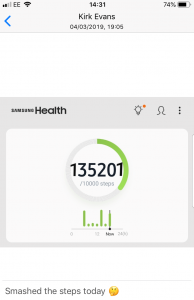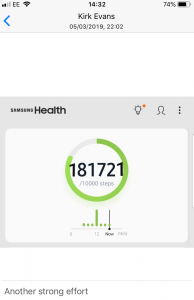
Aisha Farndon
May 16, 2019
What employees really think about mental health initiatives
It’s Mental Health Awareness Week, so I thought I’d share what’s been happening at Orange Towers to improve mental health awareness recently - from an employee’s perspective. From step challenges to thank you cards and Westfield Rewards - do they really make a difference?
1. An incentivised team steps challenge
We recently undertook a steps challenge, where the team with the highest number of steps was awarded with a spa day. We all know the benefits of exercise for mental health. Let’s not pretend that recognised disorders can be cured with a ‘gym prescription’ (see You can’t cure depression by working out, Vice.com). However, as that same article notes, exercise can be a very useful supplementary therapy for recognised disorders. It can also be used to ward off stress and burnout.



Relevant perks are generally more motivating. I was on the winning team and I doubt it’s any surprise it consisted of two mums and a dad. You really can’t buy an excuse to be pampered that most parents probably neglect. I certainly have. So the prize was a much bigger motivator for me. It’s also a lesson in how extrinsic motivation can sometimes lead to intrinsic motivation. By competing for the prize, I remembered how good getting extra exercise can be. And that’s by someone who believed they walked almost everywhere. And yes, it did decrease my stress levels and wake me up every morning. It also made me remember how my early morning gym sessions (pre-child) used to wake me up every morning and clear my head a little of the previous day’s worries.
2. Giving out thank you cards
Gratitude is strongly correlated with greater happiness. However, we’re not always mindful of it. Last month, thank you cards were left on the table and we were encouraged to thank someone for what they had done.
“In positive psychology research, gratitude is strongly and consistently associated with greater happiness. Gratitude helps people feel more positive emotions, relish good experiences, improve their health, deal with adversity, and build strong relationships.”
Giving thanks can make you happier, Havard Health Publishing



There was a genuinely positive atmosphere at work, as people gave out and received thank you cards. The exercise showed the importance of being mindful of gratitude. For example, my line manager had been very understanding that morning about a childcare nightmare I was experiencing. I’d thanked her on the phone but following up with a thank you card made me fully appreciate her approach and I felt happier doing it.
3. Westfield Rewards
We all have access to Westfield Rewards at Cast UK, which includes a counselling line and covers up to six sessions of psychological therapy, along with many physical treatment costs.

It can be easy to dismiss such rewards as not having that great an impact, especially in senior-level roles where you would assume that people can afford private treatment. However, we all tend to live within our means, with money set aside for other things. Or you may be assigned a therapist you just can’t connect with. Prioritising your mental health can therefore be tough. However, when you regularly receive emails from your MD and Sales Director to use up your allowance it certainly pushes you towards action.
Final thoughts: You can’t fake a supportive culture (but sometimes you can fake it to make it)
If your sole goal in supporting better mental health is because you want to improve your Employer Value Proposition (or because you know that it leads to less sick days and increased motivation), you’re probably not alone. But your employees will probably see through it. You may still reap some of the benefits by offering outsourced employee wellness programmes (like less sick days because of treatment). However, if your employees feel like you don’t genuinely care then you’re unlikely to realise all of the benefits. However, like with the steps challenge, sometimes extrinsic motivators can lead to intrinsic motivations. And if it helps your employees, then don’t feel too guilty.
Cast UK often talks about the ‘Cast UK family’, with What’s App groups sharing funny tidbits, motivational quotes and healthy body and mind tips. If you want to find out more about working for Cast UK, then why not get in touch with our Talent Acquisition Specialist, Geoff Banks-Smith on geoffbankssmith@castuk.com
Or if you want to partner with a recruitment consultancy that genuinely cares and understands the importance of good mental health in the workplace, then contact us here or call us on 0333 121 3345


